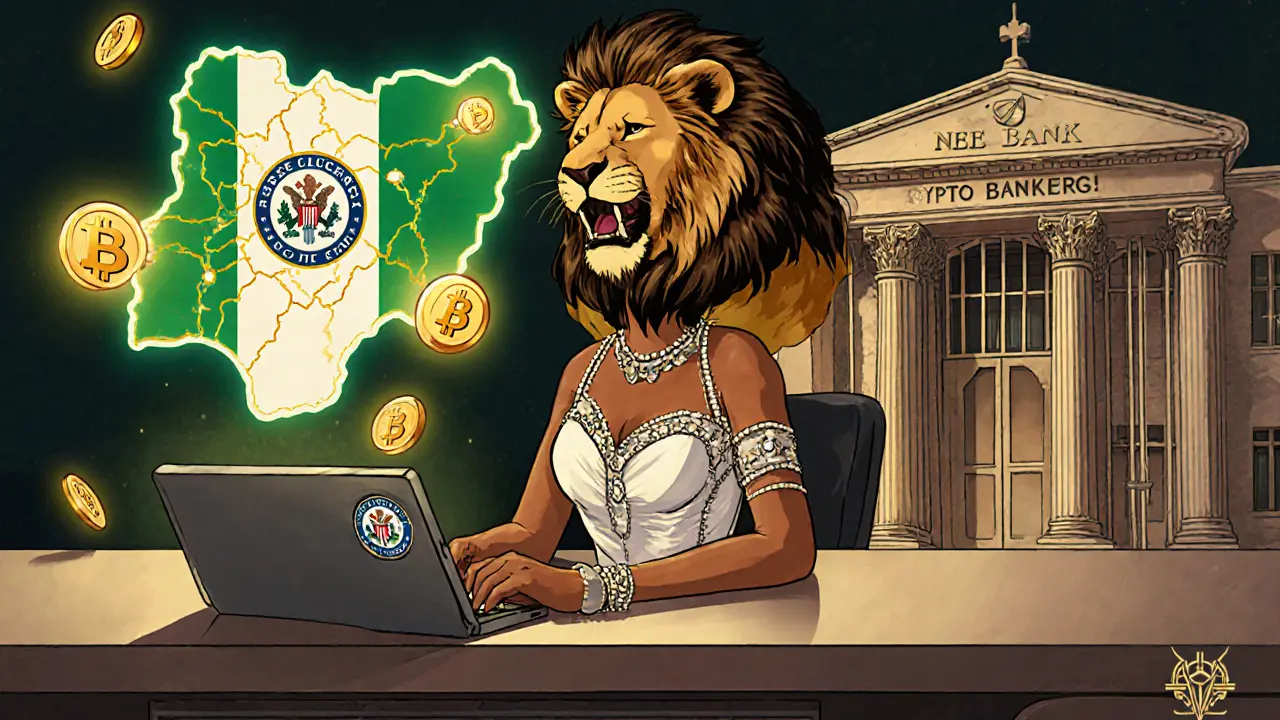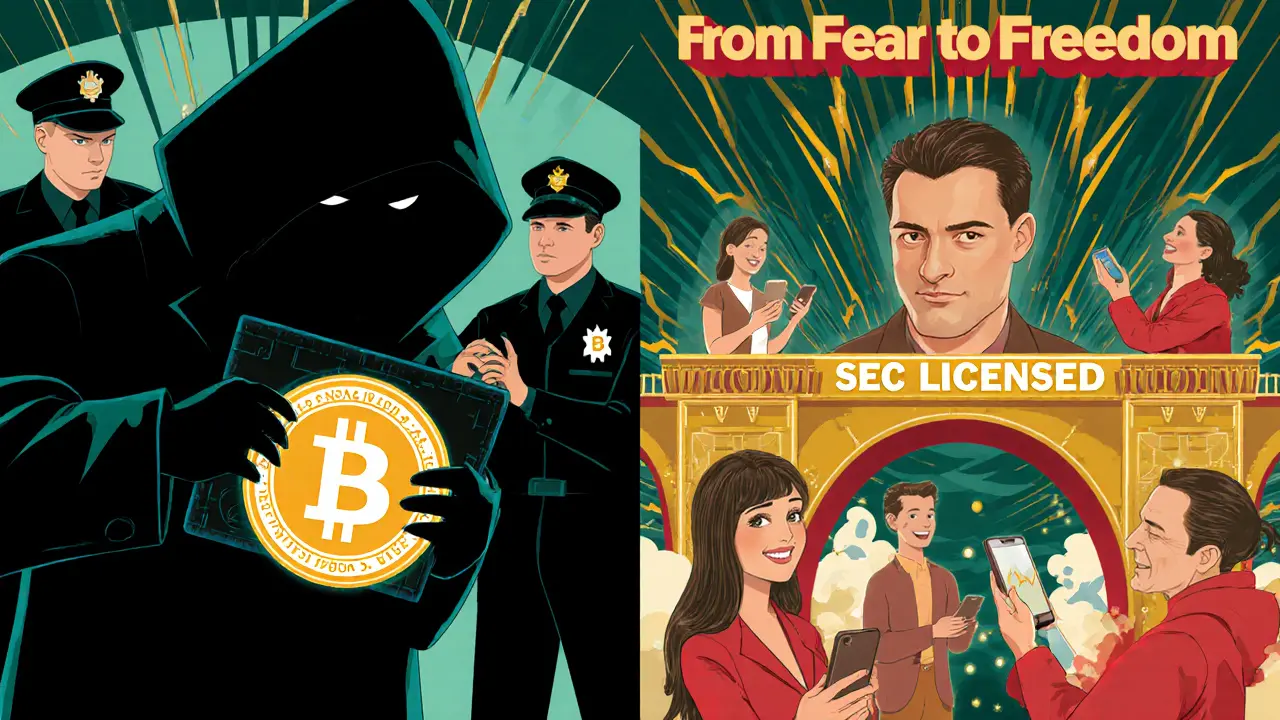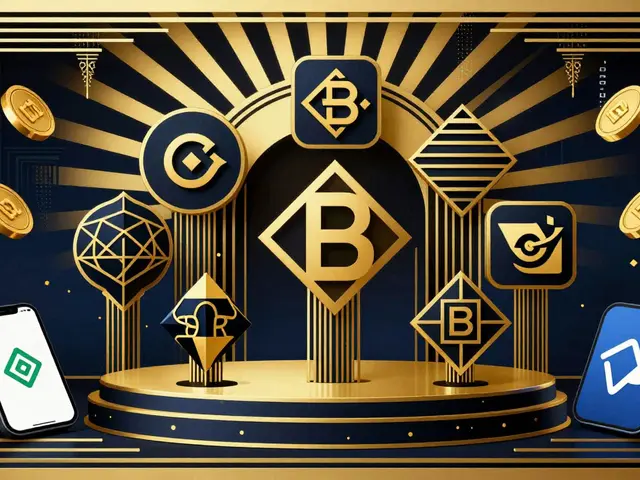Back in 2021, if you were caught trading Bitcoin in Nigeria, you might’ve been questioned by police, had your bank account frozen, or worse - forced to pay a bribe to avoid trouble. That was the norm. But today, in November 2025, the rules have completely flipped. Nigeria doesn’t ban crypto anymore. In fact, it’s trying to regulate it - and the shift is one of the biggest in global crypto policy this decade.
What Changed in 2025?
The big turning point came in March 2025, when President Bola Ahmed Tinubu signed the Investments and Securities Act (ISA 2025). This law didn’t just loosen restrictions - it rewrote the entire rulebook. For the first time, cryptocurrencies like Bitcoin, Ethereum, and others are officially recognized as securities under Nigerian law. That means they’re now treated like stocks or bonds, not illegal gambling tools.
This wasn’t a small tweak. It was a full reversal. Before ISA 2025, the Central Bank of Nigeria (CBN) had banned banks from handling any crypto-related transactions. That ban lasted over two years. Now, the CBN is actively working with the Securities and Exchange Commission (SEC) to make sure banks can legally support licensed crypto platforms. That’s a huge deal for everyday users who used to struggle to deposit or withdraw Naira from their crypto wallets.
Who Can Operate Now?
Under ISA 2025, every crypto exchange, wallet provider, or trading platform operating in Nigeria must be licensed by the SEC. There’s no gray area - if you’re offering crypto services to Nigerians, you need approval. The first two platforms to get licensed were Quidax and Busha, both Nigerian-founded companies that had been pushing for clear rules for years.
But getting licensed isn’t easy. Exchanges now have to prove they’re following strict anti-money laundering (AML) and counter-terrorism financing (CFT) rules. They must verify every user’s identity, monitor transaction patterns, and report suspicious activity to the Nigerian Financial Intelligence Unit (NFIU). That’s why many smaller platforms still haven’t applied - the paperwork, fees, and compliance costs are high.
International exchanges like Binance and Coinbase are watching closely. They want access to Nigeria’s massive crypto market - over 22 million people trade crypto here, making it the #1 country in the world for peer-to-peer (P2P) transactions. But unless they set up local entities and go through the SEC process, they’re still technically operating illegally.
What’s Still Banned?
There’s no blanket ban on crypto anymore - but not everything is legal. The law clearly says that digital versions of the Nigerian Naira (like CBDCs or stablecoins pegged to the Naira) are not considered crypto assets. That means platforms offering Naira-backed tokens fall under different rules, usually controlled by the CBN.
Also, artistic NFTs - digital art, collectibles, or music files - are left out of SEC oversight. But if an NFT is sold as an investment, promising future profits or royalties, it’s now classified as a security and must be registered. That’s a key distinction. You can still buy a digital painting. But if someone tells you it’s an “investment opportunity,” they’re breaking the law unless they’re licensed.
Online forex trading platforms that also offer crypto are now under SEC scrutiny too. If they’re taking money from Nigerians to trade crypto or forex, they need a license. Many unregulated platforms that used to operate under the radar are shutting down or fleeing the country.

Why the Change? The Real Reason Behind the Law
Nigeria didn’t pass ISA 2025 because regulators suddenly loved crypto. They passed it because they had no choice.
By 2023, over 22 million Nigerians - mostly under 35 - were using crypto daily. The country’s P2P trading volume hit $400 million in 2025. Why? Because inflation was eating away at the Naira, banks were unreliable, and remittances from abroad were slow and expensive. Crypto became the backup system for millions.
Regulators realized they couldn’t stop it. So they tried to control it. As CBN Governor Godwin Emefiele admitted in a 2024 speech, “We were caught off guard by how fast people adopted crypto. Now we’re playing catch-up.”
The goal? Stop fraud. Stop scams. Stop police extortion. And yes - start collecting taxes. The SEC has confirmed they’re working on a crypto tax framework. While details aren’t public yet, experts expect capital gains taxes on crypto profits and transaction reporting requirements for exchanges.
But Here’s the Problem: Enforcement Still Doesn’t Match the Law
Here’s where things get messy.
Even though the law says crypto trading is legal, police officers across Nigeria are still arresting people for owning crypto wallets. In Lagos, Abuja, and Port Harcourt, users report being pulled over, having their phones seized, and being asked to pay 50,000 to 500,000 Naira ($30-$300) to avoid charges - even if they’re using licensed platforms like Quidax.
Reddit threads and Twitter spaces are full of stories. One user, @NaijaCryptoGuy, posted: “I used Busha to send crypto to my brother in the UK. Two days later, police came to my house. They said ‘you’re laundering money.’ I showed them my transaction history. They still took my phone and demanded cash.”
Banking remains another headache. Even licensed users say their accounts get frozen if they make frequent crypto deposits. Banks still don’t fully understand the new rules. Some still refuse to open accounts for crypto traders, even if they have SEC-approved licenses.
And here’s the kicker: most Nigerians don’t know what “licensed” even means. If you’re trading on Binance or KuCoin, you’re not protected by Nigerian law - even if you’re using the app legally. There’s no official list of approved exchanges published in plain language. People are guessing.

What Should You Do as a Nigerian Crypto User?
If you’re trading crypto in Nigeria today, here’s what you need to do:
- Only use SEC-licensed platforms. Right now, that’s Quidax and Busha. Check their websites - they all display their SEC license number.
- Never use unlicensed international exchanges for large deposits. Binance, Kraken, and others aren’t regulated here. Your funds aren’t protected if something goes wrong.
- Keep records. Save every transaction receipt, wallet address, and exchange statement. If police come knocking, you need proof you’re not laundering money.
- Don’t trust social media “gurus.” If someone promises 10x returns on crypto, they’re probably running a scam. The SEC is cracking down on these, but they’re still everywhere.
- Report harassment. If police or security agents demand money because you own crypto, file a complaint with the EFCC or NFIU. There’s an official portal for reporting financial crimes - use it.
What’s Next for Nigeria’s Crypto Market?
The future looks promising - if the government sticks to the plan.
Industry analysts say Nigeria could become “the fintech capital of Africa.” With clear rules, foreign investors are starting to take notice. Venture capital firms in Silicon Valley and London are now scouting Nigerian crypto startups for funding. Local developers are building new DeFi tools tailored for Nigerian users - like crypto-based savings apps that pay interest in Bitcoin.
But the biggest hurdle isn’t technology. It’s consistency. Can the SEC, CBN, and EFCC actually work together without confusion? Can police be trained to stop harassing crypto users? Can banks finally accept crypto businesses as legitimate?
Right now, the law is strong. The implementation is shaky. The people are ready. The question isn’t whether Nigeria will succeed with crypto - it’s whether its institutions can catch up fast enough.
Final Reality Check
Nigeria’s crypto story isn’t about bans anymore. It’s about adaptation. The government didn’t win the battle against crypto. It surrendered - and then decided to build something better.
For the average Nigerian, that means more freedom to move money, more tools to protect savings, and more chances to earn income in a volatile economy. But it also means more responsibility. You’re not just a trader now. You’re part of a regulated system. Learn the rules. Protect yourself. And don’t let outdated enforcement scare you away from what’s now legal.
The crypto revolution didn’t come to Nigeria because of tech. It came because people needed it. And now, the system is finally trying to catch up.
Is it legal to trade crypto in Nigeria in 2025?
Yes, it’s legal - but only if you use platforms licensed by Nigeria’s Securities and Exchange Commission (SEC). As of October 2025, Quidax and Busha are the only two fully licensed exchanges. Trading on unlicensed platforms like Binance or Kraken is not protected under Nigerian law and carries legal risk.
Can I still use Binance or Coinbase in Nigeria?
You can still access them technically, but they’re not licensed by Nigeria’s SEC. That means your funds aren’t protected under local law, and you have no legal recourse if the platform freezes your account or shuts down. The SEC has warned users to avoid unlicensed platforms. For safety, stick to Quidax or Busha.
Why do police still arrest people for owning crypto?
Because enforcement hasn’t caught up with the law. While ISA 2025 legalized crypto trading, many police officers and local officials haven’t been trained on the new rules. Some still believe crypto is illegal. Others use it as an excuse to extort money. If you’re harassed, report it to the Economic and Financial Crimes Commission (EFCC) or the Nigerian Financial Intelligence Unit (NFIU).
Are crypto taxes coming to Nigeria?
Yes. The SEC has confirmed it’s developing a tax framework for cryptocurrency transactions. While exact rates and rules aren’t public yet, experts expect capital gains taxes on profits and mandatory reporting by licensed exchanges. Expect official announcements in early 2026.
Can I open a bank account if I trade crypto?
It’s possible - but difficult. Banks are slowly learning to work with licensed crypto businesses, but many still hesitate. If you’re using a licensed exchange and keeping clean records, you have a better chance. Some fintech banks like Opay and Palmpay now offer crypto-friendly accounts. Avoid traditional banks unless you’re prepared for delays or account freezes.
What’s the difference between a licensed and unlicensed crypto exchange in Nigeria?
Licensed exchanges (like Quidax and Busha) are regulated by the SEC, follow anti-money laundering rules, verify user identities, and report suspicious activity. They’re legally allowed to partner with banks. Unlicensed exchanges operate outside the law - they can be shut down anytime, your money isn’t protected, and you have no legal recourse if something goes wrong.
Are NFTs legal in Nigeria?
Artistic NFTs - like digital art or music files - are legal and not regulated by the SEC. But if an NFT is sold as an investment (e.g., promising future profits, royalties, or resale value), it’s classified as a security and must be registered. Selling unregistered investment NFTs is illegal.



